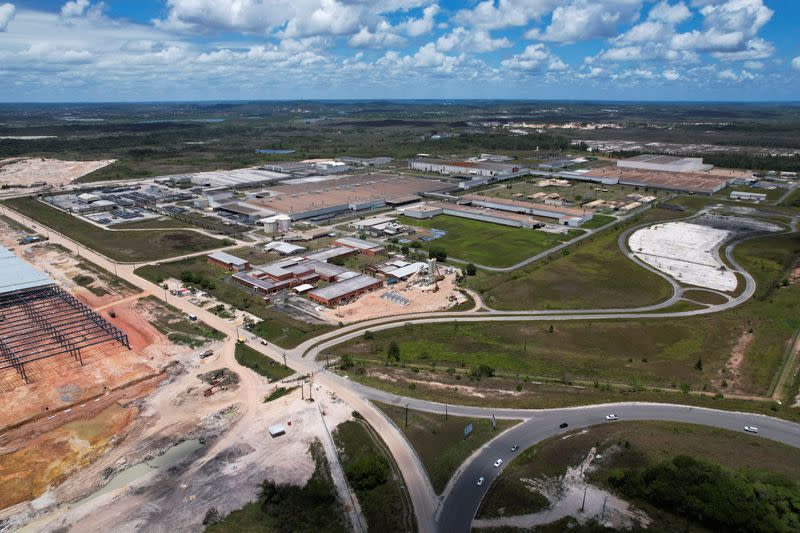
Brazil claims that laborers at the BYD factory in China are being trafficked
In an increasingly contentious move in BYD’s largest international market, Brazilian labor officials stated Thursday that Chinese laborers at a building site for a facility owned by China’s electric vehicle manufacturer are victims of human trafficking.
Following a meeting with officials from both companies, Brazil’s Labor Prosecutor’s Office stated in a statement that BYD (002594.SZ) and contractor Jinjiang Group have agreed to help and shelter the 163 workers in hotels until an agreement to terminate their contracts is achieved.
Prosecutors’ reasoning for their decision was not explained in the brief statement.
Requests for comment on Friday were not immediately answered by Jinjiang or BYD. The Brazilian government’s conclusion on Monday that the laborers at the plant in the eastern state of Bahia were working in “slavery-like conditions” was challenged by Jinjiang.
In a social media post that was published by a BYD representative, Jinjiang claimed that there were translation errors and that the workers’ depiction as “enslaved” was incorrect.
A BYD official later blamed “foreign forces” and certain Chinese media of “deliberately smearing Chinese brands and the country and undermining the relationship between China and Brazil” after the company first claimed to have severed its links with Jinjiang.
On Wednesday, China’s foreign ministry announced that its embassy in Brazil was in contact with the Brazilian government to confirm and resolve the matter. A request for comment on the trafficking allegation was not immediately answered by the ministry on Friday.
Prosecutors from Brazil promised to meet with the corporations again on January 7 in order to provide a deal proposal.
The increasing impact of China in Brazil
A settlement might exempt BYD and Jinjiang from a labor prosecutor’s inquiry, but they might still be subject to scrutiny from federal prosecutors and labor inspectors, who have asked for evidence exchange so that “measures can be adopted in the criminal sphere,” according to the statement.
As part of its intentions to begin manufacturing in Brazil early next year, BYD has been constructing a factory that can initially produce 150,000 cars. In the first 11 months of 2024, Brazil accounted for nearly one out of every five cars that BYD sold outside of China.
The facility has come to represent China’s increasing sway over Brazil and a stronger partnership between the two nations. Just to establish the Bahia industrial complex, BYD has spent $620 million.
One of the main points of contention in bilateral relations may be the reports of irregularities in Bahia.
Brazil has been looking for greater Chinese investment for a long time. However, President Luiz Inacio Lula da Silva prioritizes the creation of local jobs, and China’s strategy of bringing Chinese workers to the nations where it invests poses a threat to this goal.
The inquiry also draws unwanted attention to BYD, which is looking to grow internationally after establishing a stronghold in China, the largest auto market in the world, where it currently controls over one-third of the market for EVs and plug-in hybrids.
BYD has been expanding both domestically and internationally, increasing capacity and going on a big hiring binge as it prepares to surpass Ford and Honda in worldwide sales this year. As of September, the corporation employed close to one million people.
Even while China still accounts for over 90% of its sales, BYD has been expanding its marketing expenditures worldwide and constructing passenger car plants in Hungary, Mexico, Thailand, Uzbekistan, and Brazil to serve its important international markets.
Records on the Chinese company’s information database Tianyancha show that Jinjiang also performs construction for BYD in China.
Uncommon Chinese retaliation against Byd
The episode has sparked a rare backlash against BYD on Chinese social media, sparking a debate over worker rights. According to some online users, the living circumstances for the Brazilian workers were similar to those on Chinese construction sites.
Videos of the laborers’ living conditions, which included bunk beds without mattresses, were made public by Brazilian prosecutors. According to the authorities, the working conditions were terrible, and the workers put in extremely long hours, often seven days a week.
Degrading working circumstances, excessive hours that endanger the health of employees, debt bondage, and any work that infringes upon human dignity are all considered “slavery-like conditions” in Brazil.
The well-known Chinese pundit Hu Xijin, a former editor of the Communist Party tabloid Global Times, agreed with Jinjiang that there can be miscommunications but that Chinese construction firms have to enhance the living conditions of their workers.
According to Hu, the example illustrates how BYD, China’s most strong EV brand, is expected to face similar issues in the future.
“BYD’s only option is to increase its own standards and keep up with its expanding impact in every way. Although this is difficult, BYD ought to be able to handle it.
All Categories
Recent Posts
Tags
+13162306000
zoneyetu@yahoo.com



